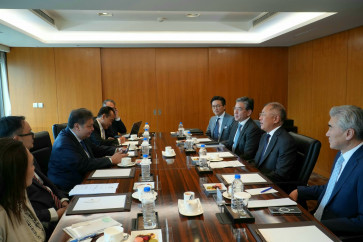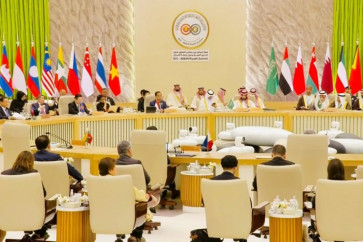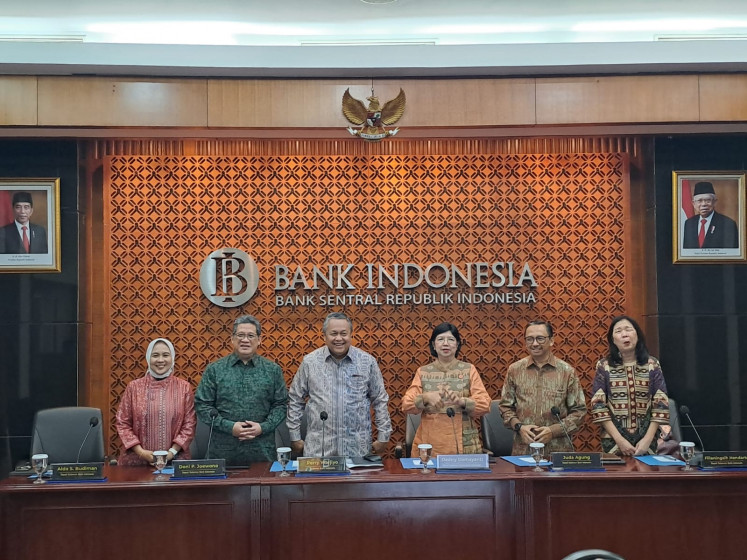Part 1: What is management accountancy?
Starting today, The Jakarta Post’s management page will have a biweekly column on various aspects of management written by experts from CIMA
Change Size

S
em>Starting today, The Jakarta Post’s management page will have a biweekly column on various aspects of management written by experts from CIMA. The following article and the next one are introductions to CIMA. Enjoy the read!
Editor
Ask any finance professional why they chose a career as a management accountant and it’s likely they will tell you that they want to make an impact on the business world. A career in management accounting is a great way to get to the heart of business. Financial literacy is increasingly becoming one of the key skills required to reach the top of the business ladder and chartered management accountants are well equipped to become the business leaders of the future.
Unlike other types of accountants, finance professionals who have qualified with the Chartered Institute of Management Accountants (CIMA) are uniquely trained to use their skills to add value to an organization and help drive it toward greater success — whether it’s in industry, commerce, not-for-profit or the public sector.
Today, you will find chartered management accountants among the world’s top business leaders. These include: Douglas Flint, group finance director of global bank HSBC; Alfred Ramosedi, managing director of Nedbank Private Bank in South Africa; Deepesh Lad, FD at Barclays Capital Singapore; and Thivanka Rangala, group chief commercial officer at Dialog Telekom in Sri Lanka.
Many people are attracted to management accountancy because it’s forward-looking. Rather than just studying how an organization has performed in the past, chartered management accountants are geared toward analyzing performance, assessing business possibilities, grasping opportunities and shaping the future.
Finance is central to the operations of any organization and the skills acquired by chartered management accountants enable them to work at the core of an organization and understand its broader dynamics from a financial perspective.Another attraction of management accountancy is career flexibility. The skills of management accounting are not limited to the finance function.
Opportunities can also be found in a variety of roles including business analyst, project manager, forensic accountant, director of change, director of operations, director of business planning, group treasurer, chief executive officer and company chairman. The qualification also provides an excellent financial foundation for anyone wanting to start up their own business ventures.
As an internationally recognized institute and leading authority on the development of management accounting, a professional qualification in management accountancy carries a mark of prestige around the world.
So what does it take to become a chartered management accountant? To excel in any financial management role, specific talents are needed. Excellent communication skills are essential. A management accountant’s function is not only to interpret complex data but to discuss it clearly with finance and non-finance professionals alike.
It is also essential that prospective management accountants are comfortable dealing with uncertain, qualitative or future-orientated information. Unlike financial accountants who generally follow the methodology laid down by accounting standards or Generally Accepted Accounting Practices (GAAP), management accountants choose the solutions to their technical problems from a range of academic or commercial approaches. In brief, it’s an attractive career for problem-solvers who enjoy combining leadership with strong analytical skills.
One of the aspects of the CIMA qualification that employers most value is the strong focus on ethics which runs through the training and membership. The institute is committed to upholding the highest ethical and professional standards in order to maintain public confidence in management accountancy and its role in corporate accountability and transparency. This is enshrined in the institute’s code of ethics and ethical support services.
Despite the global economic downturn, it is fair to say that there has probably never been a better time to be a management accountant.
The current global shortage of skilled accounting and finance professionals and the fact that businesses are increasingly turning to finance professionals to guide them through the downturn means that management accountancy is one of the few professions to be experiencing increased demand for its services in the downturn.
The institute is also working hard to encourage companies to make the best use of management accountants. For many chartered management accountants, the future is in “business partnering”.
The institute has always promoted the benefits of management accountancy but, more recently, the institute has focused on demonstrating the value that management accountants can add outside the finance function.
Over the past few decades, the finance function has become a very different entity. The shifting management agenda, developments in information technology and the drive toward shared services and outsourcing has seen a dramatic reduction in the size of the average finance team.
The demand for more varied and detailed information is also increasing. Companies need finance people who are adept not only at evaluating current business activity but in modeling the future. The institute firmly believes that its members should be utilized as business partners who can use financial information to add strategic value to a company’s decision-making process.
CIMA students and members enjoy support from the institute throughout their careers. The institute provides a comprehensive range of support services and tools for its students. Once qualified, members must follow a program of continuing professional development to ensure that they keep up to date with legal and professional changes and innovations in their field.
With 172,000 students and members in 165 countries, CIMA provides the opportunity to become part of a global network of movers and shakers.
The writer is Chief Executive of CIMA. For more information, please visit http://www.cimaglobal.com
Editor
Ask any finance professional why they chose a career as a management accountant and it’s likely they will tell you that they want to make an impact on the business world. A career in management accounting is a great way to get to the heart of business. Financial literacy is increasingly becoming one of the key skills required to reach the top of the business ladder and chartered management accountants are well equipped to become the business leaders of the future.
Unlike other types of accountants, finance professionals who have qualified with the Chartered Institute of Management Accountants (CIMA) are uniquely trained to use their skills to add value to an organization and help drive it toward greater success — whether it’s in industry, commerce, not-for-profit or the public sector.
Today, you will find chartered management accountants among the world’s top business leaders. These include: Douglas Flint, group finance director of global bank HSBC; Alfred Ramosedi, managing director of Nedbank Private Bank in South Africa; Deepesh Lad, FD at Barclays Capital Singapore; and Thivanka Rangala, group chief commercial officer at Dialog Telekom in Sri Lanka.
Many people are attracted to management accountancy because it’s forward-looking. Rather than just studying how an organization has performed in the past, chartered management accountants are geared toward analyzing performance, assessing business possibilities, grasping opportunities and shaping the future.
Finance is central to the operations of any organization and the skills acquired by chartered management accountants enable them to work at the core of an organization and understand its broader dynamics from a financial perspective.Another attraction of management accountancy is career flexibility. The skills of management accounting are not limited to the finance function.
Opportunities can also be found in a variety of roles including business analyst, project manager, forensic accountant, director of change, director of operations, director of business planning, group treasurer, chief executive officer and company chairman. The qualification also provides an excellent financial foundation for anyone wanting to start up their own business ventures.
As an internationally recognized institute and leading authority on the development of management accounting, a professional qualification in management accountancy carries a mark of prestige around the world.
So what does it take to become a chartered management accountant? To excel in any financial management role, specific talents are needed. Excellent communication skills are essential. A management accountant’s function is not only to interpret complex data but to discuss it clearly with finance and non-finance professionals alike.
It is also essential that prospective management accountants are comfortable dealing with uncertain, qualitative or future-orientated information. Unlike financial accountants who generally follow the methodology laid down by accounting standards or Generally Accepted Accounting Practices (GAAP), management accountants choose the solutions to their technical problems from a range of academic or commercial approaches. In brief, it’s an attractive career for problem-solvers who enjoy combining leadership with strong analytical skills.
One of the aspects of the CIMA qualification that employers most value is the strong focus on ethics which runs through the training and membership. The institute is committed to upholding the highest ethical and professional standards in order to maintain public confidence in management accountancy and its role in corporate accountability and transparency. This is enshrined in the institute’s code of ethics and ethical support services.
Despite the global economic downturn, it is fair to say that there has probably never been a better time to be a management accountant.
The current global shortage of skilled accounting and finance professionals and the fact that businesses are increasingly turning to finance professionals to guide them through the downturn means that management accountancy is one of the few professions to be experiencing increased demand for its services in the downturn.
The institute is also working hard to encourage companies to make the best use of management accountants. For many chartered management accountants, the future is in “business partnering”.
The institute has always promoted the benefits of management accountancy but, more recently, the institute has focused on demonstrating the value that management accountants can add outside the finance function.
Over the past few decades, the finance function has become a very different entity. The shifting management agenda, developments in information technology and the drive toward shared services and outsourcing has seen a dramatic reduction in the size of the average finance team.
The demand for more varied and detailed information is also increasing. Companies need finance people who are adept not only at evaluating current business activity but in modeling the future. The institute firmly believes that its members should be utilized as business partners who can use financial information to add strategic value to a company’s decision-making process.
CIMA students and members enjoy support from the institute throughout their careers. The institute provides a comprehensive range of support services and tools for its students. Once qualified, members must follow a program of continuing professional development to ensure that they keep up to date with legal and professional changes and innovations in their field.
With 172,000 students and members in 165 countries, CIMA provides the opportunity to become part of a global network of movers and shakers.
The writer is Chief Executive of CIMA. For more information, please visit http://www.cimaglobal.com









